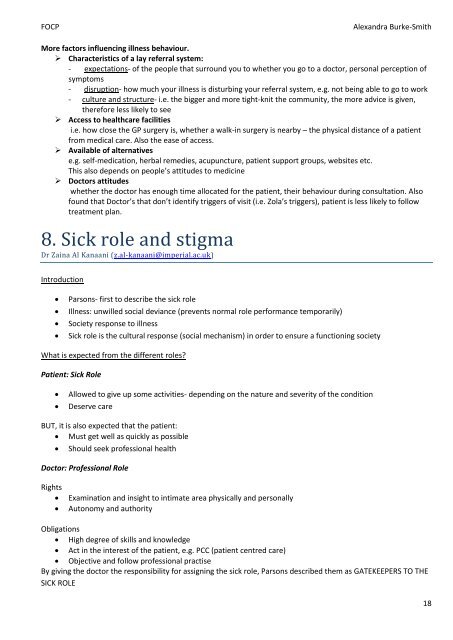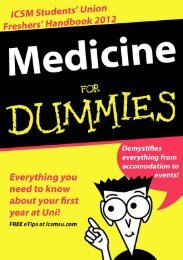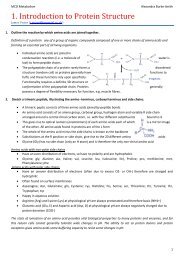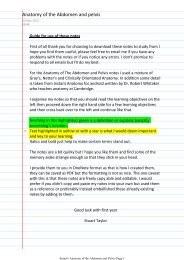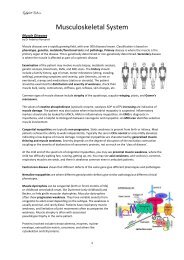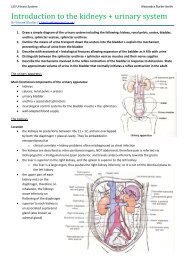1. Introduction to Medical Sociology
1. Introduction to Medical Sociology
1. Introduction to Medical Sociology
Create successful ePaper yourself
Turn your PDF publications into a flip-book with our unique Google optimized e-Paper software.
FOCP Alexandra Burke-Smith<br />
More fac<strong>to</strong>rs influencing illness behaviour.<br />
� Characteristics of a lay referral system:<br />
- expectations- of the people that surround you <strong>to</strong> whether you go <strong>to</strong> a doc<strong>to</strong>r, personal perception of<br />
symp<strong>to</strong>ms<br />
- disruption- how much your illness is disturbing your referral system, e.g. not being able <strong>to</strong> go <strong>to</strong> work<br />
- culture and structure- i.e. the bigger and more tight-knit the community, the more advice is given,<br />
therefore less likely <strong>to</strong> see<br />
� Access <strong>to</strong> healthcare facilities<br />
i.e. how close the GP surgery is, whether a walk-in surgery is nearby – the physical distance of a patient<br />
from medical care. Also the ease of access.<br />
� Available of alternatives<br />
e.g. self-medication, herbal remedies, acupuncture, patient support groups, websites etc.<br />
This also depends on people’s attitudes <strong>to</strong> medicine<br />
� Doc<strong>to</strong>rs attitudes<br />
whether the doc<strong>to</strong>r has enough time allocated for the patient, their behaviour during consultation. Also<br />
found that Doc<strong>to</strong>r’s that don’t identify triggers of visit (i.e. Zola’s triggers), patient is less likely <strong>to</strong> follow<br />
treatment plan.<br />
8. Sick role and stigma<br />
Dr Zaina Al Kanaani (z.al-kanaani@imperial.ac.uk)<br />
<strong>Introduction</strong><br />
� Parsons- first <strong>to</strong> describe the sick role<br />
� Illness: unwilled social deviance (prevents normal role performance temporarily)<br />
� Society response <strong>to</strong> illness<br />
� Sick role is the cultural response (social mechanism) in order <strong>to</strong> ensure a functioning society<br />
What is expected from the different roles?<br />
Patient: Sick Role<br />
� Allowed <strong>to</strong> give up some activities- depending on the nature and severity of the condition<br />
� Deserve care<br />
BUT, it is also expected that the patient:<br />
� Must get well as quickly as possible<br />
� Should seek professional health<br />
Doc<strong>to</strong>r: Professional Role<br />
Rights<br />
� Examination and insight <strong>to</strong> intimate area physically and personally<br />
� Au<strong>to</strong>nomy and authority<br />
Obligations<br />
� High degree of skills and knowledge<br />
� Act in the interest of the patient, e.g. PCC (patient centred care)<br />
� Objective and follow professional practise<br />
By giving the doc<strong>to</strong>r the responsibility for assigning the sick role, Parsons described them as GATEKEEPERS TO THE<br />
SICK ROLE<br />
18


